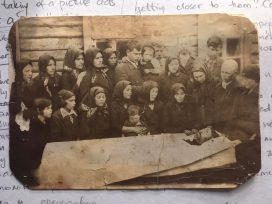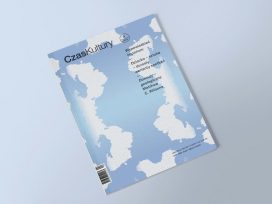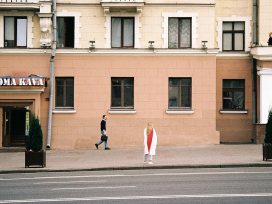This article is based on a speech given at in Mahilou, Belarus, on 11 June 2009, in receipt of the Honest Word Prize.
Good evening! First of all, I would like to thank all the organizers of this event, and especially the editor of Arche and the other members of the editorial board, for this great honour. I don’t know whether I deserve it or not, but I believe that it will give me, and not just me, additional inspiration to work for the sake of Belarus. I also thank everyone who decided to share this evening with us.
Allow me to emphasise right from the beginning that I do not belong to any political party or political movement, and that my thoughts today reflect only my personal point of view. I do not live in Belarus, and so I do not claim the right to teach anyone here how to live. However, as a Belarusian who wants to see a free, flourishing and self-confident Belarus, I believe I have the right to voice my thoughts about the future of the country, and to share these thoughts with you.
Yesterday, my wife and I returned to Belarus from a two-day trip to Vilnius. In this city, which once belonged to the Grand Duchy of Lithuania, and which now belongs to the Republic of Lithuania (two quite different things), one thing is obvious: how self-confident the Lithuanians are in their city, in their country, and in the European space in general. It is a pleasure to behold. As for us in Belarus, everything is the reverse. On their road signs, the Lithuanians write “Minskas” and “Gardinas” for “Minsk” and “Hrodna”. We, on the other hand, are so considerate, so concerned about hurting people’s feelings, that we officially call the city “Vilnius”, instead of using its traditional Belarusian name, “Vilnia”.
Perhaps with Vilnius it’s understandable: there is some logic to calling a city by the name used by its own inhabitants. But how about Belarusian cities? In early June, we went to Hrodna, which in Russian and Polish, is spelled “Grodno”. Overall, we got a very good impression of the city, but there was a curious incident with the map hanging at the bus station there. It proved useful in locating historical monuments. But, according to the map, the English name of the city is “Grodna”. Does that mean that, in the names of Belarusian cities, we accept the “a”, but consider the Belarusian “h” to be a mistake? What is a foreign tourist supposed to think when he thought he was going either to “Hrodna” or “Grodno”, and ended up in the hybrid “Grodna”? Here in Mahilou I met a nice chap, a student from Nepal. He refers to Mahilou in English as “Mogilev”. But what is he supposed to call the city – where he has, by the way, been living for about a year – when we ourselves have taught him that our name for the city is wrong? If you don’t believe that this is so, take a look at any one of the few English-language inscriptions in Mahilou, and you will see that, according to them, the city is called “Mogilev”. To this I’ll add that, according to the English-language version of Wikipedia, the name of the city of Polack is to be rendered in English as “Polotsk”. The authors of the entry on the city cite several Belarusian government websites, which refer to the city not as “Polack” or “Polatsk”, but “Polotsk”.
What is this, if not an inferiority complex? It is usual for small countries with large neighbours to have this sort of complex, and Belarus is no exception. One would think that this sort of complex would be stronger in Lithuania, but that is not so. In my view, the main reason for this is that the Lithuanians are proud of their history. To what extent they are right in ascribing to themselves all the achievements of the multiethnic Grand Duchy of Lithuania is another question. However, the result of their pride is the Lithuanians’ view of their homeland as a small country with strong and deep roots. In Belarus, the state, under the influence not so much of a singular ideology but of a singular personality, largely ignores older Belarusian history, especially the period of the formation of Belarus as a nation, and instead reminds the people each year of the Great Patriotic War.
Lithuania offers tourists the Castle of Grand Duke Gediminas, while Belarus proposes Stalin’s Line, a series of World War II fortifications. But why should one be surprised by this, when the former KGB building in Vilnius now houses the Museum of Genocide Victims? When the KGB building in Minsk, as we know, has remained the KGB building? When you are in a Belarusian city, you get the impression that Belarusian history began in about 1941. Undoubtedly, the Second World War was a very important period in the modern history of Belarus. However, it is painful to see, in cities whose history goes back almost a thousand years, how we are ordered to remember only three or four years. Belarus is, today, not a small country – in fact it is quite spacious. But it is one that lacks historical roots. No wonder, then, that we say Mahilou (many of the city’s residents pronounce the name of the city that way even when speaking Russian), but for foreigners we write “Mogilev”.
What is the way out of this situation? For today’s leadership of the country, the solution lies in the creation of an artificial Belarusian patriotism, whose aim is to legitimise the regime as a defender of Belarus and to simultaneously neutralise the attractiveness of Belarusian nationalism. On half the billboards in Minsk, if not more than half, one can see the beaming faces of representatives of various branches of the armed forces, happily prepared to sacrifice themselves in defending the country. The only question is: from whom? In reality, Belarus has no enemies today. But that does not prevent a girl dressed in national costume from saying to her border-guard boyfriend on one of these billboards, “I will go with you to the border.”
Clearly, there are attempts to turn Belarus into a fortress, at a time when 27 neighbouring countries, including five Slavic ones and four Orthodox Christian ones, see their future not in self-isolation, but in the construction of “a common European home”, to borrow a phrase from Mikhail Gorbachev. With due respect for Belarusian soldiers, I would like to remind you that the experience of countries like Pakistan and Turkey, and also the United States under George W. Bush, shows what happens if the military is turned into the main symbol of the state.
Another way out of the crisis of shallow roots that the modern Belarusian state suffers from is to unite nationality with religion. This path is being attempted both by the leadership of the country and by part of the opposition. President Alaksandr Lukashenka has been widening the role of the Orthodox Church in society, while the Church, in its turn, has been legitimising the regime, at times quite cynically. Belarusian TV news recently showed a spokesman for the Belarusian Orthodox Church, who, with an empty expression in his eyes, said that Belarus has the best legal structure in Europe. At the same time, one of the pro-opposition Belarusian youth organisations active in the United States, whose website is linked to by the sites of several independent Belarusian organisations and publications, as well as those of opposition parties, claims that every nation has its religion, that the religion of the Belarusians is Christianity, and that it is impossible to be a good Belarusian without being a Christian.
Ladies and gentlemen, this is stupidity, if not insanity. One only has to look at the effects of a confusion of religion and nationality in Orthodox Serbia under Slobodan Milosevic, or in Protestant-Catholic Northern Ireland. One can also look at the effect on ethnic and religious minorities, as well as neighbours, of Israel’s self-definition as a state for Jews, or Pakistan’s self-definition as a state for Muslims.
This does not at all mean that Belarus must reject Christianity. On the contrary, while being a Muslim, I desire to see a truly Christian Belarus. That would be a Belarus where everyone is automatically respected, including someone who is not popular with the majority of the population. That is the teaching of Jesus Christ, as I understand it. If the majority of the Belarusian population see themselves as Christian believers, Christianity must play an important social role. In politics, laws written in secular conditions should be inspired by Christian morality and Christian principles of charity.
However, that does not at all mean that I wish to see a Belarus where all Belarusians are sure that God Himself supports their collective views, wishes and actions based only on the fact that they are Belarusian Christians (here one is again reminded of Bush). And if one is supported by God, one is right in all circumstances. A person who thinks along these lines loses his conscience and turns into a robot. Belarus can be a Christian country, but it must never be a country for Christians. There is a huge difference between these two concepts. Belarus must be a country for all its citizens: for Jews, for Muslims, for Christians, for atheists: for everyone. This is not simply a popular slogan of the Barack Obama era, but a principle that was used successfully for centuries by such states as the Grand Duchy of Lithuania and the Ottoman Empire (both of whom, for instance, accepted thousands of Jewish refugees, victims of the fanatical anti-Semitism of western Europe).
If it is completely undesirable to name this or that religion a necessary attribute of a Belarusian, and if we are today unfortunately in a condition where we lack pride in our own history, what are we supposed to do in order to “reach” Belarus, in the words of the poet Nil Hilevich? In my personal opinion, we should largely do two things. First of all, we should give a new meaning to the word “Belarusian”. Secondly, we need to approach the political situation in the country more realistically.
In Belarus there is no commonly accepted, short and good sounding word to mean “a citizen of Belarus”. The term “citizen of Belarus” itself sounds artificial and bureaucratic. A person may be called a citizen of Belarus on paper. But who will answer the question “Who are you?” with the sentence, “I am a citizen of Belarus”? One will rather answer with a word that comes from the heart. One will say, Ja bielarus, that is, “I am a Belarusian”. But here the problem is that the word bielarus today has an overwhelmingly ethnic sense. Your ancestors were ethnic Belarusians, so you are a bielarus. But if you are from an ethnic Polish, Russian, Tatar, Roma, or Jewish family, people will call you a “Pole”, a “Russian”, and so on. The most generous of ethnic Belarusians will call you a “Belarusian Pole” or a “Belarusian Jew”.
In my opinion, this state of affairs has to be changed. Uladzimir Karatkievich says in his essay “The Land Under White Wings” that the Belarusians have “soft-featured faces”, that “there are not many dark-haired people among Belarusians”, that Belarusians’ “eye colour is most often light blue, grey or dark blue”. At the time that Karatkievich wrote this, the Soviet authorities were trying to turn the citizens of the USSR into a “Soviet people”; hence it was very important to show that the Belarusians had distinct characteristics and that they formed a separate nation. However, the situation has now changed completely. Today we have a Belarusian state of our own. We therefore have to create the conditions in which minorities, even those who don’t have “light blue, grey or dark blue” eyes, will feel proud of their belonging to Belarus. For that, what we need most of all is for all citizens of Belarus to have a common word that they can call themselves by.
Bielarus could be one such word. I fully support the Budzma bielarusami (“Let us be Belarusians”) initiative, according to which every citizen of Belarus is a Belarusian (a bielarus). However, inside this definition, there are two potential problems to contend with. Firstly, the word bielarus is intended to be used to include minorities, but there is the danger that it will be used as an instrument of assimilation, as in France. There, all French citizens with no exceptions are officially considered French. On the one hand, that is undoubtedly good, because it gives everyone at least a theoretical equality. On the other hand, when there is a public debate about discrimination against French citizens of North African (i.e. Arab or Berber) origin, it is almost impossible to find statistics that one could use to combat such discrimination. One cannot even find the number of people of North African descent in the census, since everyone in France is French. Thus, real problems go unresolved, with results that we saw in the riots in the suburbs of Paris.
The other potential danger in the general use of the word bielarus is the loss of ethnic distinctiveness on the part of members of the Belarusian ethnos. In Britain there has been a tendency to reject terms such as “British culture” or “English culture”, because they are seen as being discriminatory against the cultures of minorities such as the Afro-Caribbeans or the South Asians, who are equally British, but have distinct and diverse traditions. But then what about the culture of, say, ethnic Englishmen?
Therefore, it is perhaps best of all to revive the good old Belarusian word bielarusiec, which also means “Belarusian”, and has long been out of use. Today it perhaps sounds funny and archaic, but, if we start using it, it is quite possible that it will become an ordinary word, and even a beloved one. We could call every citizen of Belarus a bielarusiec. In that way, all citizens of Belarus would be united into one family with one name, but each ethno-cultural group, including ethnic Belarusians, would be able to retain all their distinctiveness. A few months ago, on the forum of the Budzma bielarusami website, I read a comment by someone writing in Belarusian, who said: “Under no circumstances am I a Belarusian (bielarus); I am a Pole, but I respect Belarusian culture”. This was in response to Budzma bielarusami‘s advocacy of the use of the word bielarus to include all Belarusian citizens. Can one imagine, in the US, for example, someone born in that country saying, “Under no circumstances am I an American; I am an Italian (or an Irishman, or a German, or whatever), but I respect American culture”? In the US, that would be impossible. But here in Belarus, for some reason an ethnic Pole or Russian, even when he loves Belarus, doesn’t want to be called a Belarusian (bielarus). And even if he were to call himself a Belarusian, there will be people who will say, “What sort of Belarusian is this? No, this is a Russian! This is a Pole! This is a Gipsy!” In 2000, I was watching the sports news on Belarusian TV one day. The anchor was calling all Belarusian athletes Belarusians, but one athlete with a Jewish name he called “woman from Minsk”. This must stop.
If all Belarusian citizens turn into bielaruscy (the plural of bielarusiec), a person belonging to a minority will be able to proudly call himself a palak-bielarusiec (Polish-Belarusian), a tataryn-bielarusiec (Tatar-Belarusian), a habrej-bielarusiec (Jewish Belarusian), underlining both their ethnic distinctiveness and their belonging to a united Belarus. And as for ethnic Belarusians, they would remain Belarusians (bielarusy), which will unite them with all ethnic Belarusians, whether they be citizens of Belarus, Russia, Poland, the US or Canada. But the ethnic Belarusians of Belarus would also become bielaruscy, which would finally unite them with Belarusian citizens of other origins.
And finally: Belarusians who want to see changes in Belarus towards democracy and civil freedoms have to understand that the regime of President Alaksandr Lukashenka has a strong social support base. And if we want to see change, we have to, first of all, convince members of this base. It’s not enough for us to keep repeating that the Lukashenka regime is illegitimate, the way many opposition politicians do. Yes, perhaps from the point of view of the 1994 constitution, it is actually illegitimate. But legitimacy depends not just on laws and constitutions. It also depends on what ordinary people think. As long as almost half of all Belarusians think that the monopolisation of power by Lukashenka serves their interests, it is not, in reality, that important how the actions of the president hold up before the former constitution.
We have to offer the people something of our own, something new. I am pleased to see the new tendency of the Belarusian opposition to offer Belarusians a European future. However, that is not enough. In Ukraine, Viktor Yushchenko and Yuliya Tymoshenko also once offered their people a European future, and what came of it? It’s not enough for the opposition to accept words of support from EU representatives. It has to work to obtain a firm commitment from the EU that democratisation in Belarus would have as a consequence an invitation from Brussels to embark upon the EU accession process. And then it would be possible to propose to the Belarusian people a real alternative: Belarus as part of a united Europe instead of a self-isolated Belarus.
At the same time, it is necessary to explain to those who support Lukashenka because they like the idea of various alliances with Russia, or because they like the relatively high level of pensions in Belarus, that democracy does not mean forfeiting one or the other. It does not mean the conversion of Belarus into Poland or Lithuania. It simply means free elections, freedom of the press, freedom of conscience, freedom of assembly: simply put, the freedom to choose. And the freedom to choose is as necessary as air to every person and every nation that wants to live in dignity.
This article is based on a speech given at in Mahilou, Belarus, on 11 June 2009, in receipt of the Honest Word Prize.





